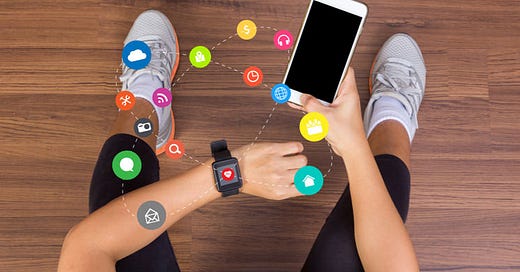If you’ve been following the headlines in the tech industry, your attention may be centered on the regulatory stories, skyrocketing bitcoin prices, or articles describing how Elon Musk’s companies made it into the S&P 500 and made it into space.
All these topics are really interesting and important, but there’s another category, albeit less dramatic, that’s been of great intrigue for me. Recent announcements from healthcare tech companies are catching my eye, particularly the ones focused on health monitoring, wearables, and wellness tracking.
This is a category that I’ve followed for a long time and have written about on more than one occasion. As someone who is passionate about health and wellness, I think the impact and opportunity for companies in this market are tremendous.
Here are some of the recent announcements in the health tracking space and some key reasons why you should care.
Whoop
In late October, fitness tracker Whoop announced it raised $100 million in new funding from superstar athletes like Patrick Mahomes, Rory McIlroy, alongside traditional venture investors. The company caught the attention of athletes and investors alike because of the quality of data and tracking on sleep, exercise, and daily movements.
According to users, it gives intelligent details about the quality of your sleep and activity, in addition to how much more you can push yourself on activities throughout the day, based on a number of inputs. In this way, it becomes a silent coach and motivator for people looking to up their output and optimize their diet and exercise routines.
Why You Should Care: In addition to providing useful data on activity and sleep levels, the tech company is now demonstrating that it may be suited to help tackle more life-threatening issues. Recent data illustrates that the Whoop tracker could potentially serve as an early detector for things like Covid-19.
According to the company, a study that was performed in conjunction with CQUniversity in Australia showed that the tracker could identify changes in respiratory rates that could distinguish differences among infected and non-infected individuals, serving as a cue for a person to self-isolate and seek further testing. As you can imagine with something of this magnitude, more testing and research needs to be performed. However, the value of potential early detection could imply that the company’s current valuation of $1.2 billion could be understated.
Levels
Earlier this week, Levels, a startup that focuses on glucose monitoring and metabolic health, announced it raised $12M in seed capital to bring what could be a game-changing wearable product to market. The company currently boasts a waitlist of over 50,000 excited users, which demonstrates strong consumer demand for a much-needed product.
Seeing a company raise this amount of capital from such notable names 18 months after it was founded is an impressive feat. One quote from the founder summed up their value proposition really well:
“You shouldn’t need a PhD in nutrition or human physiology to know what to eat for lunch. Levels is the first product that takes the guesswork out of daily lifestyle choices with personalized, objective data,”
-Josh Clemente, Levels Founder and President
Why You Should Care: What makes Levels interesting is that it makes it easy to understand how the foods you eat directly impact your metabolic health. Research suggests that only 12% of Americans are considered metabolically healthy and nearly 85% of people with prediabetes don’t even know they have it. If the company can better serve this massive market, its opportunity to make a real tangible impact is tremendous.
If you invest any meaningful time focused on wellness in your daily life, the type of data that Levels provide could dramatically optimize the way you do things.
Amazon Halo
Not to be outdone by smaller names in the space, Amazon also announced that it too will be entering the health wearable market. The launch of Amazon Halo, back in August, was met with a number of interesting comments. One not-so-flattering and contentious article insinuated that Amazon introduced its competing Halo product only after meeting with the Whoop team about a potential investment opportunity.
Regardless, many people are fascinated by the retail giant’s efforts in this field. Industry analysts recently reported the sizable market opportunity that is available to Amazon, particularly through Baby Boomers, which is a demographic that is usually not prone to adopting sophisticated technology like wearables.
The $1.5B market opportunity is being pegged to Amazon’s ability to deliver data and insights to Baby Boomers facing chronic condition management. Given that the device gathers tons of data but doesn’t have a screen to interface with or complex buttons, it could serve as an ideal way to engage with non-tech savvy consumers and convert them into regular customers and Prime users.
Why You Should Care: First, Amazon’s entry into this space could signal a larger industry focus on wearables, which is already a crowded space. Increased consolidation or competition or partnership opportunities are all possible. More importantly, if the company does decide to focus its go-to-market efforts on Baby Boomers, it could represent a larger strategy that aligns with its recent announcement around Amazon Pharmacy. Few companies are positioned to offer end-to-end consumer services like Amazon. Their penetration into this space could happen swiftly.





Great info, thanks!